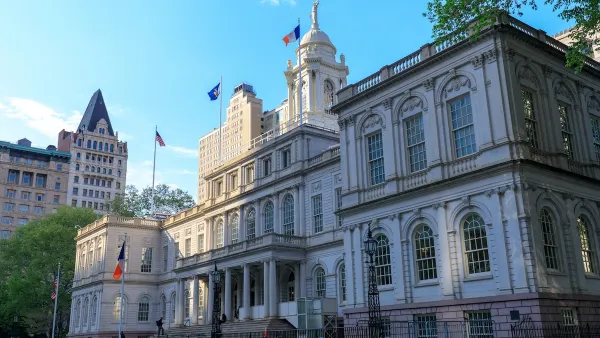With energy and the economy both causing headaches, 2008 has been a big year for local governments recognizing and planning for peak oil. Finding a way forward in a future of constrained energy will require much of planners.
"2008 was a big year for government responses to peak oil. Post Carbon Cities, which tracks local government responses to the issue, has added a number of new towns -- not just the "usual suspects" -- to its list. But the bill is rapidly coming due on our "energy gluttony problem," and U.S. cities are left bedecked with infrastructure that requires cheap, easy energy.
The way ahead is not obvious for either planners or government officials. Planning and engineering practice is still rooted in a 20th-century mindset that assumes energy --and especially gasoline-- will be readily available and affordable for decades to come. As decades-long trends of both suburbanization and globalization come up against the resource limits of the 21st century, we'll have to move quickly to adjust to the new rules.
One of those new rules was explained succinctly by Bloustein School of Planning (Rutgers University) Dean James Hughes this past June: 'Distance matters.' If 2008 turns out to be the year that the big post-war economic and development trends finally came to an end, perhaps it will also be the year that we finally stopped pretending that distance didn't matter."
FULL STORY: Post Carbon Cities 2008 Year in Review

Maui's Vacation Rental Debate Turns Ugly
Verbal attacks, misinformation campaigns and fistfights plague a high-stakes debate to convert thousands of vacation rentals into long-term housing.

Planetizen Federal Action Tracker
A weekly monitor of how Trump’s orders and actions are impacting planners and planning in America.

San Francisco Suspends Traffic Calming Amidst Record Deaths
Citing “a challenging fiscal landscape,” the city will cease the program on the heels of 42 traffic deaths, including 24 pedestrians.

Defunct Pittsburgh Power Plant to Become Residential Tower
A decommissioned steam heat plant will be redeveloped into almost 100 affordable housing units.

Trump Prompts Restructuring of Transportation Research Board in “Unprecedented Overreach”
The TRB has eliminated more than half of its committees including those focused on climate, equity, and cities.

Amtrak Rolls Out New Orleans to Alabama “Mardi Gras” Train
The new service will operate morning and evening departures between Mobile and New Orleans.
Urban Design for Planners 1: Software Tools
This six-course series explores essential urban design concepts using open source software and equips planners with the tools they need to participate fully in the urban design process.
Planning for Universal Design
Learn the tools for implementing Universal Design in planning regulations.
Heyer Gruel & Associates PA
JM Goldson LLC
Custer County Colorado
City of Camden Redevelopment Agency
City of Astoria
Transportation Research & Education Center (TREC) at Portland State University
Jefferson Parish Government
Camden Redevelopment Agency
City of Claremont





























